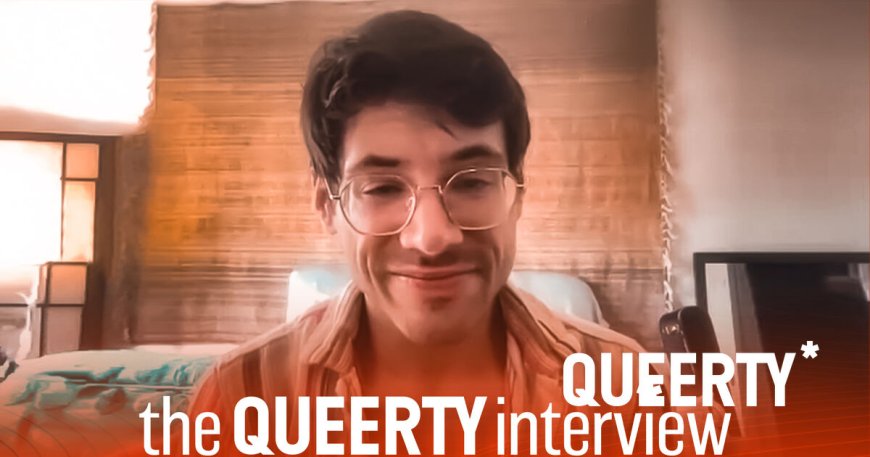Joseph Kibler is a multifaceted advocate shaping the future of disability, HIV & queer identity
Meet Joseph Kibler, an inspiring advocate reshaping the narratives around disability, HIV, and queer identity.

When you think about superheroes, you might picture someone with super strength or the power to fly. But let us introduce you to Joseph Kibler, a real-life hero making waves in the worlds of disability, HIV, and queer identity.
He’s also an actor, producer, comedian, and advocate—and his story is truly inspiring.
A twin’s legacy and pioneering HIV research
How about we take this to the next level?
Subscribe to our newsletter for a refreshing cocktail (or mocktail) of LGBTQ+ entertainment and pop culture, served up with a side of eye-candy.
Subscribe to our Newsletter today
Joseph’s journey begins with a poignant twist. He and his identical twin brother, John, were both born HIV-positive in 1989. Their early life was marked by a struggle against the stigmas surrounding HIV.
“They tested for everything, except for HIV, because it was 1989. And they just weren’t testing for that, especially from a woman and two children who were middle class, non-IV drug users, heterosexual, Caucasian,” he tells Queerty in an exclusive interview. “We just didn’t fit the stereotypes and the stigmas that they tested for.”
Once the HIV diagnosis was made, Joseph and his brother were immediately brought to the National Institute of Health, where he joined Dr. Anthony Fauci’s infant HIV studies.
Joseph and his brother’s involvement in these drug trials has helped doctors grasp how to better treat the virus—even being part of those initial trials that led to the insight that being undetectable means untransmittable (U=U).
“We were able to be a part of that trial to figure out, essentially, what dosage was good enough to give infants and what was the healthy dosage that they should get.”
Despite the progress, Joseph’s brother, John, passed away from complications with pneumonia at just 16 months old.

At 16 years old, Joseph honored his brother’s memory with a special tattoo.
“My mom would always tell me that I was the most content baby ever. I didn’t cry, didn’t whine, could be held by anyone. And John wasn’t. Suddenly, after he passed away, I started crying and I could only be held by my mom. She always feels like he somehow knew that they needed that time together.”
In a surprising twist, the day John died is the exact same day Joseph’s now wife, Carey, was born. “It’s wild that such a hard day for me is also a day of celebration for someone I love.”
Finding love and family planning

Joseph’s relationship with his wife, Carey, is the stuff of modern fairy tales.
Both actors, both pansexual, both living with disabilities (Carey has Ehlers-Danlos Syndrome, or EDS, which impacts connective tissue), both passionate advocates, and married since May 2023, they’re now navigating the tricky waters of family planning.
“We both really have wanted to build a family together,” Joseph says. “The perception of two disabled people having kids is complicated. It’s complicated for adoption, it’s complicated for natural birth and how people perceive you.”
Their award-nominated short film Adoptive takes a comedic look at some of these issues head-on.
Related
Study suggests healthcare providers should seriously rethink how they talk about HIV & low viral loads
Is it helpful to know your precise HIV viral load even if it’s super low?
Looking ahead with hope and determination
With a complex mix of visible and invisible identities, Joseph’s journey of self-discovery unfolded like peeling an onion—one layer at a time.
“For most of my life, it’s been this gradual process,” Joseph muses. “I had to accept my disability before I could face my HIV, and only then could I fully embrace my sexuality. It was quite a challenge.”
He believes his experiences with disability have given him a unique view of life. “I was forced to slow down and smell the roses. I think it is being able to take things, to be very grateful for everything, and to be kind of patient.”
As a long-term HIV survivor, Joseph’s outlook for the future is shifting to one of hope and proactive planning.
“I hope to actually put things on paper that we want to do and that I want to do with my family,” Joseph expresses. “For the first 25 years of my life, it just wasn’t even comprehensible. I just didn’t imagine I would be here. And it took me so long to figure it out that eventually I was like, ‘Oh wait, I am here. Now I gotta do something with this.’”
Related
Disabled man living with HIV goes viral with a powerful reminder about stigma: “The first letter in HIV stands for Human”
Joseph Kibler has cerebral palsy and HIV.
Joseph’s advice: Embrace vulnerability and openness
Joseph’s story is a heartfelt reminder of the diverse experiences within the LGBTQ+ community. He encourages others to be open about their identities.
“Opening yourself up is always scary,” he says. “But I think it comes with a lot more pros than cons. When you allow yourself to be vulnerable and open, you find others that are willing to be vulnerable and open back to you.”
For those interested in following Joseph’s work, you can find him on Instagram and TikTok at @josephakibler. His YouTube channel with his wife, Joseph & Carey, features various projects, including their insightful videos on disability and family.
Additionally, you can stream Adoptive on YouTube or the Easterseals Disability Film Challenge website, and his earlier documentary, Walk On, will be returning to streaming platforms soon.

 Mark
Mark 





